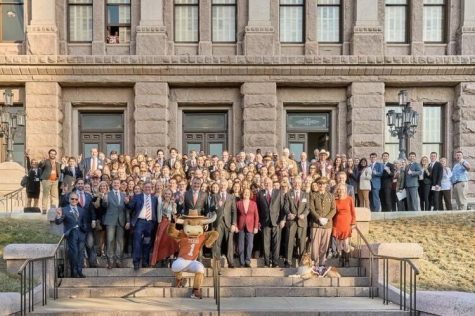UT, Texas A&M join forces at Capitol, advocate for student affordability, mental health
March 3, 2023
Texas A&M University and UT joined forces to push for increased allocation of research funds, more mental health resources and aids to student affordability from the Texas Legislature.
“We’re the two flagship universities that educate a huge chunk of Texas,” said Christopher Diem, Texas A&M School of Medicine assistant dean of student affairs. “It’s a very powerful force … and when it comes to funding our two schools, we are way more powerful together than we are trying to compete with each other.”
Since 2003, faculty, alumni and student volunteers have gathered to visit 181 representatives during the biennial legislative session at the Texas Capitol for Orange and Maroon Legislative Day. During last month’s advocacy day, they urged representatives to push for more higher education funding for tuition to account for the universities’ enrollment growth and increased student living costs.
According to the legislative day handbook, this higher education funding directly fuels the universities’ mission of educating students. State funding helps take the strain off of students and their families, resulting in improved education of Texas students.
“I’m very aware of how much it costs for (students) to be in school here and how much more it is each year,” Diem said. “(We are) making sure the state is paying their piece of that.”
Daniel Becka, vice president of constituent relations at Texas Exes, said the volunteers focused on the Texas Grant Program, a need-based grant covering full tuition and fees for Texas resident students. Because every eligible student is unable to receive a grant with the amount of available funds, Becka said volunteers urged representatives to ask for full funding of the grant.
“The legislature knows very well the value in investing in higher education,” Becka said. “That includes investing affordability for students and increasing access to all Texans to high quality higher education.”
When students have access to the resources higher education provides, they are able to make more tangible, long-term contributions to Texas, which Becka said encourages legislatures to contribute.
Isabel Agbassi, UT Student Government vice president, said she focused more on student affordability and mental health when talking to the representatives.
“Especially in Austin, we’re seeing inflation with how expensive housing is, groceries and basic things people need to survive,” Agbassi said. “That dramatically impacts students’ ability to do well in class and graduation and retention.”
Agbassi said mental health was her top priority, as the pandemic left a big footprint on mental health issues with students.
“(Mental health resources) need to be more comprehensive and needs more staffing, and all of that relates to funding,” Agbassi said. “I’m talking about things I’ve seen with close friends going through different mental health challenges, especially with the pandemic and social isolation.”
Orange and Maroon legislative volunteers met in person for the first time since 2019. This year, Diem said they made lingering COVID-19 effects, particularly mental health, a priority. No matter their political party or individual policies, he said most representatives listened to requests to fund psychiatry residency programs and reimburse the universities’ current programs.
“All these investments we’re making in tuition and research (don’t) matter if (students) don’t make it across the finish line,” Diem said.





